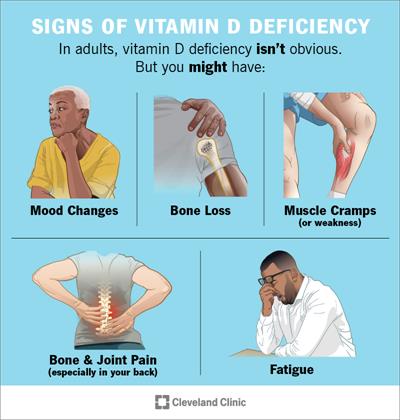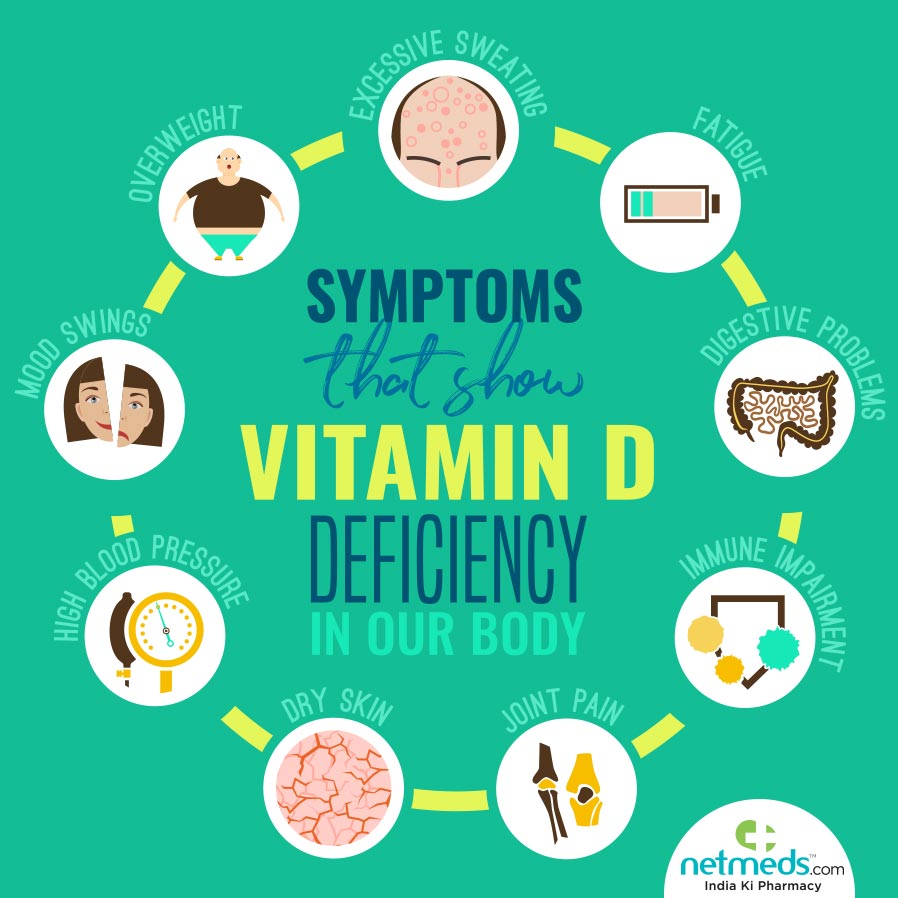Vitamin D deficiency is caused by a lack of exposure to sunlight, which can lead to various symptoms such as fatigue, bone pain, and muscle weakness. Treatment for vitamin D deficiency includes increasing sunlight exposure and taking supplements.
Causes Of Vitamin D Deficiency
Vitamin D deficiency can be caused by various factors, including:
Lack Of Exposure To Sunlight
A lack of exposure to sunlight is one of the most common causes of vitamin D deficiency. Sunlight is essential for the body to produce vitamin D naturally. When the skin is exposed to sunlight, it stimulates the production of vitamin D in the body. However, many people spend significant time indoors or live in regions with limited sunlight, especially during winter. This decreased exposure to sunlight can lead to vitamin D deficiency.
Certain Disorders
Certain disorders can contribute to vitamin D deficiency. These disorders can affect the body’s ability to absorb or metabolize vitamin D. Some examples of such disorders include:
- Malabsorption syndromes: Conditions such as celiac disease, Crohn’s disease, and cystic fibrosis can impair the absorption of vitamin D from the intestines, leading to deficiency.
- Liver and kidney diseases: The liver and kidneys are crucial in converting vitamin D into active form. If these organs are not functioning correctly, it can result in vitamin D deficiency.
- Obesity: Excess body fat can sequester vitamin D, making it less available for the body to use. This can contribute to vitamin D deficiency in obese individuals.
If you suspect you may have a vitamin D deficiency, it is essential to consult with a healthcare professional for an accurate diagnosis and appropriate treatment. They may recommend vitamin D supplementation or other interventions to address the deficiency and improve your overall health.

Symptoms Of Vitamin D Deficiency
Vitamin D deficiency symptoms include fatigue, sleep disturbances, bone pain, depression, hair loss, muscle weakness, loss of appetite, and increased susceptibility to illness. Addressing this deficiency through proper treatment and increasing vitamin D intake is essential.
Fatigue:
Fatigue is one of the most common symptoms of vitamin D deficiency. If you feel tired and lacking energy, it could be a sign that your body lacks vitamin D. This can affect your daily activities, making it difficult to perform even simple tasks. Increasing your vitamin D levels may help alleviate fatigue and improve your overall energy levels.
Bone pain or achiness:
Another symptom of vitamin D deficiency is bone pain or achiness. Low vitamin D levels can lead to weak bones, osteomalacia, bone pain, and muscle weakness. Suppose you often experience unexplained bone pain or achiness. In that case, it may be due to a lack of vitamin D. Increasing your vitamin D intake through sunlight exposure or supplementation can help relieve these symptoms.
Depression or Feelings of Sadness:
Vitamin D deficiency has been linked to depression and feelings of sadness. Research suggests that vitamin D plays a role in the production of serotonin, a neurotransmitter that regulates mood. When your vitamin D levels are low, it can affect serotonin levels, potentially leading to depressive symptoms. If you’re experiencing persistent feelings of sadness or depression, it may be worth checking your vitamin D levels and considering supplementation.
Hair Loss:
Hair loss can also be a sign of vitamin D deficiency. While there can be various causes for hair loss, low vitamin D levels can contribute to the problem. Vitamin D is essential for hair follicle health, and its deficiency can disrupt the hair growth cycle. If you’re experiencing excessive hair loss or notice thinning hair, it’s worth considering vitamin D deficiency as a possible contributing factor.
Muscle Weakness:
Muscle weakness is another symptom commonly associated with vitamin D deficiency. When your body lacks adequate vitamin D, it can affect muscle function and lead to muscle weakness. You may experience difficulty performing physical tasks that used to be easier for you. Increasing vitamin D levels can help strengthen your muscles and improve overall muscle function.
Loss of appetite:
A vitamin D deficiency may also contribute to a loss of appetite. If you find yourself frequently lacking interest in food or experiencing a decrease in appetite, it could be a sign that your body lacks vitamin D. Ensuring adequate vitamin D levels can help regulate your appetite and promote proper nutrition.
Getting sick more easily:
Vitamin D plays a vital role in supporting the immune system. When your vitamin D levels are low, it can weaken your immune system, making you more susceptible to infections and illnesses. It may be a sign of vitamin D deficiency if you get sick frequently or struggle to recover from common diseases. Increasing your vitamin D levels can help boost your immune system and improve your infection resistance.
Treatment Of Vitamin D Deficiency
Vitamin D deficiency is a common health issue that can have profound implications. Luckily, there are several treatment options available to address this deficiency. These treatments aim to increase vitamin D levels in the body and alleviate the symptoms associated with its deficiency. Read on to discover the different methods for treating vitamin D deficiency.
Increasing Sun Exposure
One effective way to treat vitamin D deficiency is to increase sun exposure. The skin produces vitamin D when it is exposed to sunlight. Spending time outdoors, especially during the peak hours of daylight, can help naturally increase your vitamin D levels. However, it is essential to balance sun exposure to prevent sunburn and skin damage.
Dietary Changes
Changing your diet to include foods rich in vitamin D can also help treat the deficiency. Foods such as fatty fish like salmon and mackerel, fortified dairy products, eggs, and mushrooms are excellent sources of this vitamin. Including these foods in your diet can boost your vitamin D levels, especially if sun exposure is limited.
Supplementation
If natural sunlight and dietary changes are insufficient, supplementation may be necessary. Vitamin D supplements are available over-the-counter and can effectively increase vitamin D levels in the body. However, consulting with a healthcare professional to determine the appropriate dosage for your specific needs is essential.
In conclusion, treating vitamin D deficiency involves increasing sun exposure, making dietary changes, and considering supplementation. Each method is crucial for replenishing vitamin D levels and improving overall health. Consult with a healthcare professional to determine the best treatment approach based on your needs.


Frequently Asked Questions For Vitamin D Deficiency – Causes, Symptoms And Treatment
What Is The Most Common Cause Of Vitamin D Deficiency?
The most common cause of vitamin D deficiency is a lack of exposure to sunlight. Certain disorders and a deficiency in the diet can also lead to the deficiency.
What Happens When Your Vitamin D Is Low?
When your vitamin D is low, it can cause thin, brittle, or misshapen bones, fatigue, difficulty sleeping, bone pain, muscle weakness, depression, hair loss, loss of appetite, and increased susceptibility to illness. Low vitamin D levels may also affect insulin production and immune function.
What Are 5 Signs Of Vitamin D Deficiency To Not Ignore?
Signs of vitamin D deficiency to not ignore include fatigue, poor sleep, bone pain or achiness, depression or sadness, and hair loss.
What Organ Causes Vitamin D Deficiency?
The organ that causes vitamin D deficiency is the skin. Inadequate exposure to sunlight leads to a deficiency in vitamin D. Certain disorders can also contribute to the deficiency.
Conclusion
Vitamin D deficiency can have various causes and present with multiple symptoms. A lack of exposure to sunlight commonly causes it and can result in bone pain, muscle weakness, and fatigue. Treatment involves addressing the deficiency through sunlight exposure, dietary changes, or supplementation.
It is essential to address vitamin D deficiency to maintain overall health and prevent potential complications.


